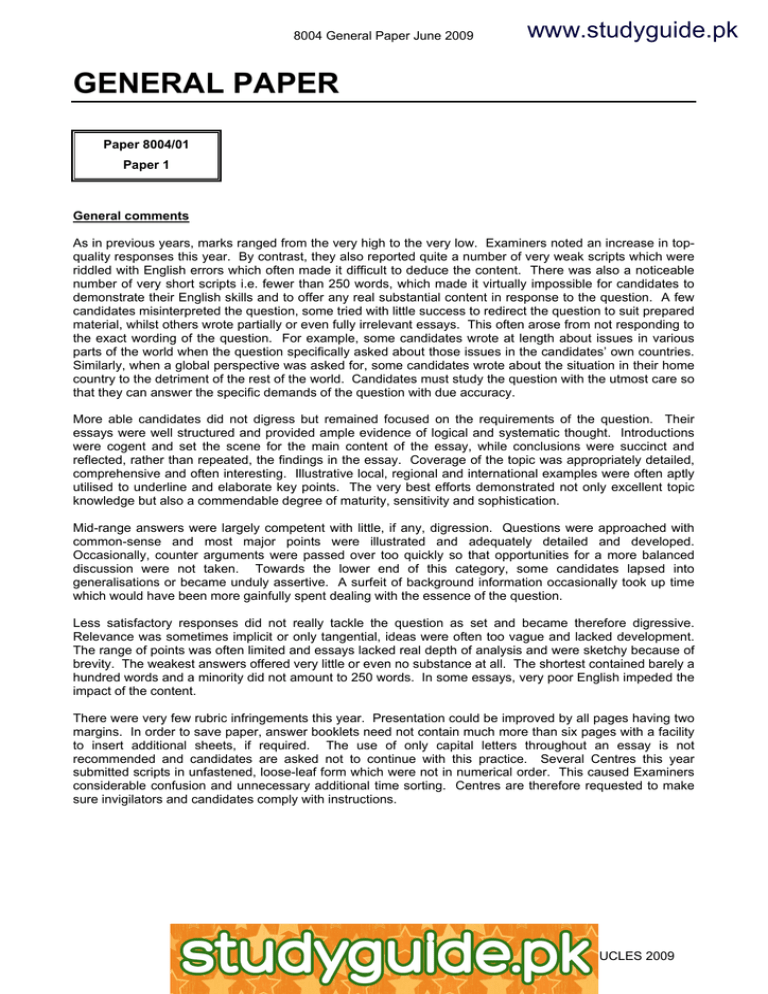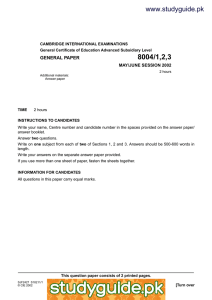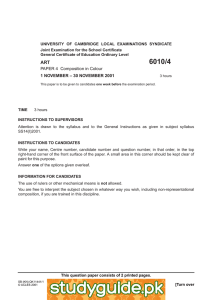GENERAL PAPER www.studyguide.pk
advertisement

8004 General Paper June 2009 www.studyguide.pk GENERAL PAPER Paper 8004/01 Paper 1 General comments As in previous years, marks ranged from the very high to the very low. Examiners noted an increase in topquality responses this year. By contrast, they also reported quite a number of very weak scripts which were riddled with English errors which often made it difficult to deduce the content. There was also a noticeable number of very short scripts i.e. fewer than 250 words, which made it virtually impossible for candidates to demonstrate their English skills and to offer any real substantial content in response to the question. A few candidates misinterpreted the question, some tried with little success to redirect the question to suit prepared material, whilst others wrote partially or even fully irrelevant essays. This often arose from not responding to the exact wording of the question. For example, some candidates wrote at length about issues in various parts of the world when the question specifically asked about those issues in the candidates’ own countries. Similarly, when a global perspective was asked for, some candidates wrote about the situation in their home country to the detriment of the rest of the world. Candidates must study the question with the utmost care so that they can answer the specific demands of the question with due accuracy. More able candidates did not digress but remained focused on the requirements of the question. Their essays were well structured and provided ample evidence of logical and systematic thought. Introductions were cogent and set the scene for the main content of the essay, while conclusions were succinct and reflected, rather than repeated, the findings in the essay. Coverage of the topic was appropriately detailed, comprehensive and often interesting. Illustrative local, regional and international examples were often aptly utilised to underline and elaborate key points. The very best efforts demonstrated not only excellent topic knowledge but also a commendable degree of maturity, sensitivity and sophistication. Mid-range answers were largely competent with little, if any, digression. Questions were approached with common-sense and most major points were illustrated and adequately detailed and developed. Occasionally, counter arguments were passed over too quickly so that opportunities for a more balanced discussion were not taken. Towards the lower end of this category, some candidates lapsed into generalisations or became unduly assertive. A surfeit of background information occasionally took up time which would have been more gainfully spent dealing with the essence of the question. Less satisfactory responses did not really tackle the question as set and became therefore digressive. Relevance was sometimes implicit or only tangential, ideas were often too vague and lacked development. The range of points was often limited and essays lacked real depth of analysis and were sketchy because of brevity. The weakest answers offered very little or even no substance at all. The shortest contained barely a hundred words and a minority did not amount to 250 words. In some essays, very poor English impeded the impact of the content. There were very few rubric infringements this year. Presentation could be improved by all pages having two margins. In order to save paper, answer booklets need not contain much more than six pages with a facility to insert additional sheets, if required. The use of only capital letters throughout an essay is not recommended and candidates are asked not to continue with this practice. Several Centres this year submitted scripts in unfastened, loose-leaf form which were not in numerical order. This caused Examiners considerable confusion and unnecessary additional time sorting. Centres are therefore requested to make sure invigilators and candidates comply with instructions. 1 www.xtremepapers.net © UCLES 2009 8004 General Paper June 2009 www.studyguide.pk Use of time Most candidates coped comfortably with writing two essays within the permitted time. A small number of candidates wrote short answers for the second essay. Some candidates wrote at unnecessary length often repeating themselves. Others wrote longish sections of their essay but then crossed everything out and started again. All this is an unproductive use of examination time which could be better utilised completing a thorough and systematic check of the English so as to eliminate careless and avoidable mistakes. Even more able candidates can waste marks sometimes by being careless about such basics as subject/verb agreement. Use of English The standard of English ranged from full operational fluency to a very weak knowledge of the language, which made it very difficult at times to understand the content. However, the content of the vast majority of essays could be followed without major problems. The tone of most essays was usually in accordance with the subject matter although some candidates did, at times, become unnecessarily ‘chatty’ where that style was not really appropriate. A minority of candidates went to great lengths to write very flowery prose and/or to use an unusually extensive range of vocabulary. The ambition is praiseworthy but having this extensive vocabulary is of diminished benefit when candidates are unable to employ these words gainfully if they are unaware of how to use them in the correct context. Common errors seen in the English in the essays this year included: ● ● ● ● ● ● ● ● ● ● ● ● ● incorrect joining up of words – e.g. infact, inturn, donot, alot, inorder, aswell, eventhough, atleast incorrect separation of words – e.g. now a days, no where, news papers, with out, more over mismatches in subject/verb agreements – e.g. ‘Many people has experienced…’ and ‘One of the main reason is…’ confusion between to/too, there/their incorrect use of apostrophes – e.g. ‘Its not her fault’ and ‘The storm lost it’s intensity’ incorrect use of the apostrophe when denoting possession misspelling of ‘opportunity’, usually oppurtunity or oportunity incorrect comparative forms such as more easier, more richer confusion between affect/effect, amount/number, economic/economical, lose/loose and alternate/alternative unnecessary overuse of ‘etc.’ problems with the appropriate use of definite and indefinite articles omission of ‘d’ on the past participle – e.g. ‘This was cause by a problem’ misuse/omission of commas leading to loss of meaning and disruption of flow. Many of these points have been highlighted in previous reports. Some Centres have clearly taken these points to heart so that their candidates now benefit from greater accuracy, but other Centres seem to have achieved relatively little progress in rectifying these errors. It is often not lack of knowledge but sheer carelessness that causes such rudimentary errors to reappear. It is therefore all the more important for candidates to leave sufficient time at the end of the examination to make a thorough and systematic check of each sentence so that obvious errors can be identified and put right. However, it is pleasing to notice by the corrections on scripts that more and more candidates have taken notice of this guidance and are not now losing marks unnecessarily. With regard to style, the ubiquitous ‘in a nutshell’ still persists. It is not an appropriate start in tone for the concluding paragraph of essays. Similarly, candidates should not refer to themselves impersonally using author/writer in such statements as ‘The author, however, begs to differ…’ and ‘This writer is not of the opinion that…’. 2 www.xtremepapers.net © UCLES 2009 8004 General Paper June 2009 www.studyguide.pk Comments on specific questions Section 1 Question 1 This question was quite popular, especially with candidates who were interested in business studies or economics. Candidates were able to point out a fair number of advantages regarding small businesses including job creation and increased tax revenues, a more personal touch and service, a chance to be selfemployed and provide trades in urban and rural areas and the possibility of providing goods and services to larger companies. Only the better candidates discussed the extent to which state encouragement should be offered, and weaker candidates made scant reference to any drawbacks of the state providing aid to small businesses. Question 2 This was quite a popular question on teenage involvement in politics. Many candidates utilised Obama’s reported popularity in the recent presidential elections amongst the youngest voters. There was much almost idealistic discussion of why teenagers should be more interested and active in politics, particularly as their future, as the next generation, is at stake. It was hard to disagree with this notion of increased teenage involvement. However, only the better candidates were able to make concrete suggestions with regard to the practical ways, areas and scope of involvement. Weaker candidates over-stressed the lack of knowledge and lack of experience of teenagers and saw this as a major obstacle, forgetting that these comments could equally apply to many others of the electorate. Question 3 This question on the effect of globalisation on family life was surprisingly not very popular. Some answers were limited in scope because they were prone to generalisation and often did not focus sufficiently on the family. This question lent itself to illustration from personal experience from within the family unit, but weaker candidates missed the opportunity to draw on observations from within their own families. However, better candidates did offer illuminating and often interesting observations from their home situation and were able to present a range of both positive and negative aspects. Question 4 This question on human rights was not overly popular, but it did attract a considerable number of high-quality answers. Good use was made of charting the appropriate country’s history on human rights, which meant that the word ‘record’ in the question was fully complied with. Depending on the country involved, answers varied from the optimistic, where clear progress on a broad range of human rights issues had been demonstrably made, to the pessimistic, where relatively little or no clear progress had been made to the shame and despair of some candidates. Question 5 This was a reasonably popular question on crime. The general consensus was that only limited, if any, progress was being achieved in effectively dealing with crime nationwide, which was generally attributed to such factors as unemployment, lawless immigrants, low numbers of poorly equipped police, failing educational, skills training and judiciary systems, bribery and corruption and an ever-widening gap between the rich and the poor. Many candidates also claimed there was little effective impetus for improvement as the rich and influential could afford to live in relative safety in gated communities, screened by security guards. Section 2 Question 6 Stem cell research was a reasonably popular topic. Candidates with a background in biology were able to explain the nature of stem cells using the appropriate scientific terms. They were also able to discuss the nature of the moral and ethical dilemmas regarding harvesting stem cells from embryos. A number of more able candidates contrasted the differences in attitudes towards stem cells between the Bush and Obama administrations. However, weaker candidates tended to be factually inaccurate and lacked knowledge and, at times, understanding of the ethical issues. 3 www.xtremepapers.net © UCLES 2009 8004 General Paper June 2009 www.studyguide.pk Question 7 This question on nuclear energy was quite popular and often well answered as many candidates engaged with the keyword ‘only’. Most candidates revealed good knowledge and understanding of nuclear energy and the more obvious alternatives. Many good answers were able to show the advantages and disadvantages of the various energy providers in different countries around the world, considering topography, climate, technical expertise and available funding. However, only the very best answers looked carefully at the actual amount of power each alternative could currently supply in each location before deciding on the most effective energy mix. Question 8 This question on statistics was not popular. However, it did attract a number of good to excellent responses from candidates who had obviously become familiar with the potential vagaries of statistics during their studies. These answers were well balanced and covered both its useful applications and its potential under certain circumstances for bias, skewing and misinterpretation. A few weaker candidates struggled with the fundamentals of statistics with the result that their responses tended to be vague, generalised and factually inaccurate. Question 9 This question on food shortage was quite popular but, unfortunately, it generated comparatively few very good responses. Weaker candidates focused on their own countries rather than on global issues. There was too much generalisation with inadequate specific reference to areas of acute food shortage. Difficulties with logistics and food distribution in remote, needy areas were scarcely mentioned. Often ‘quantity’ was dismissed as tasteless, unappetising and even rotting food, while ‘quality’ was described as fare fit for gourmets. Only the better answers paid due attention to nutritional values and demonstrated how the urgent priority is to save starving people from dying through improved agricultural techniques leading to more food production in areas of shortage. As one candidate stated - ‘Filling bellies is more important than pandering to taste buds.’ When this primary objective is achieved and fully secured, there will be scope for ‘quality’ in the form of choice and personal preference for various foods. Question 10 This question on environmental concern proved to be less popular than had been predicted. A few weaker candidates chose to overlook ‘one’ aspect and produced generalised responses which covered a plethora of environmental concerns. Better answers focused on one specific concern such as a particular type of pollution, recycling, cleaner emissions and improving fuel efficiency. Major points were well detailed and enhanced by apt illustration. Section 3 Question 11 This question was reasonably popular. Better candidates had enjoyed live theatre performances and were able to analyse and share their pleasure showing very clearly the unique aspects of the theatre, using illustration from performances to support their views. Sophisticated responses used a history of the theatre to highlight its particular attractions and to celebrate famous theatrical venues. Weaker answers did not always differentiate sufficiently well between theatre, cinema and television, but discussed points such as ‘interesting characters’ and ‘being transported to another place’ – i.e. attributes which are not unique to the theatre. Question 12 This question on art was not too popular. Average responses tended to take one perspective to the question and ignore many other avenues. A typically narrow response of this kind would focus on people who draw and paint as a hobby and do not find the cost of artistic materials to be unaffordable. Answers of this kind often did not even mention the prohibitive cost of acknowledged masterpieces. Good answers, however, did not only discuss private collections and the soaring prices for works by the established masters but also reported where masterpieces could be viewed for nothing or for an affordable sum in galleries and museums 4 www.xtremepapers.net © UCLES 2009 8004 General Paper June 2009 www.studyguide.pk Question 13 This question on advertising was quite popular and often quite competently answered, with a number of appropriate examples described and analysed from contemporary advertisements. More able candidates were well aware of the role played by advertising in the media and recognised the persuasive nature of commercial advertising and its drive to sell. This was contrasted with informative advertising with its intention to counsel, guide and, of course, inform on a series of different subjects. Question 14 There were not many responses to this question on the work of a writer. Weaker essays tended not to evaluate the writer’s work but rather to produce a kind of short book review with a brief description of the plot or of various characters. Better answers demonstrated excellent knowledge of the writer’s works and could account for any deserved popularity and fame, nationally and internationally. They also knew which works had been translated into major world languages. Question 15 This question was fairly popular with some strongly differing views expressed. Weaker candidates seemed to think that because music is free on the radio, it should be free at all other times. Few realised that much ‘free’ music was subject to radio/TV licence fees and/or charges for receiving cabled radio and TV stations. These candidates were not fully aware of a functional music industry and the need for those working in it to receive the due monetary recompense. Better answers considered the ethical issues of illegal downloading and discussed the new ways in which musicians are selling their music, such as iTunes, or consumers paying what they consider to be a fair fee. The need for musicians to earn money for their labours was duly acknowledged. 5 www.xtremepapers.net © UCLES 2009



